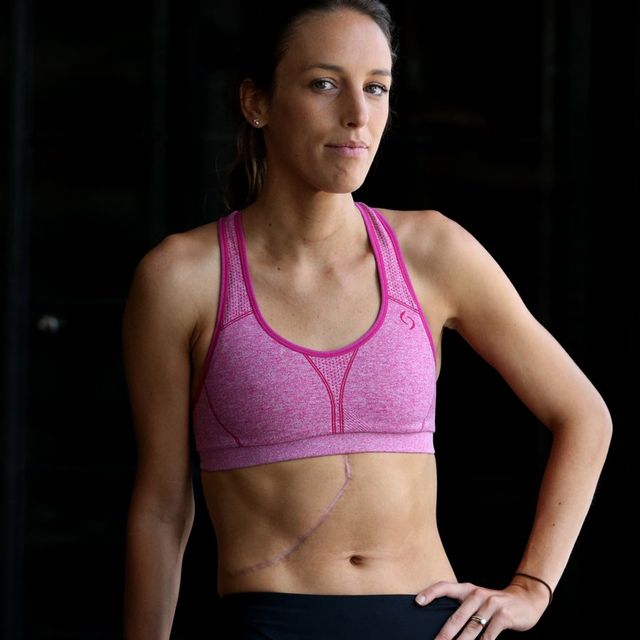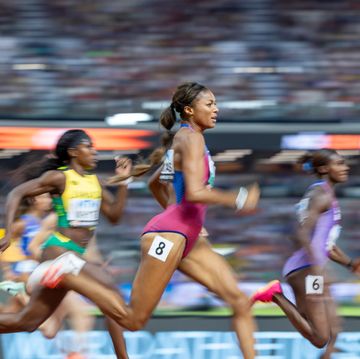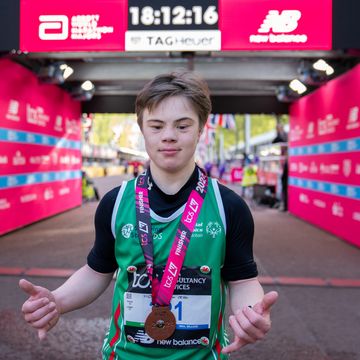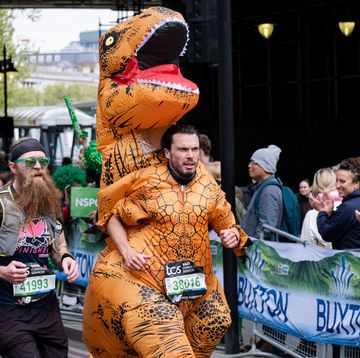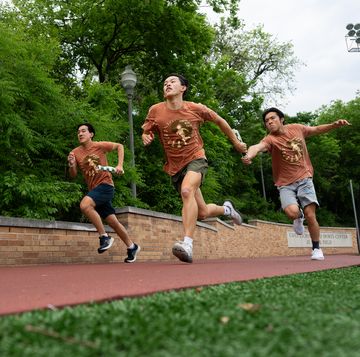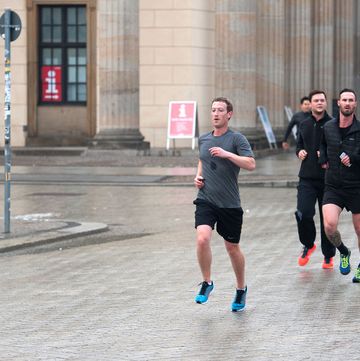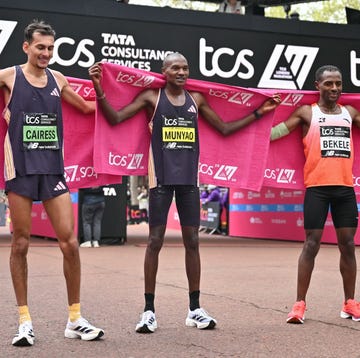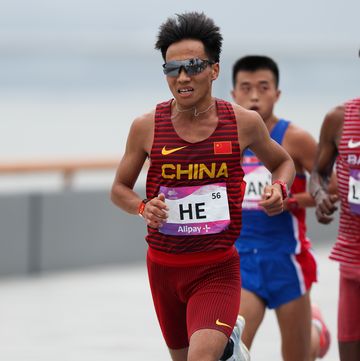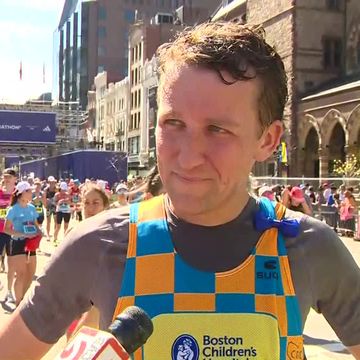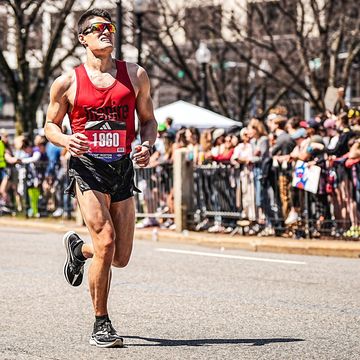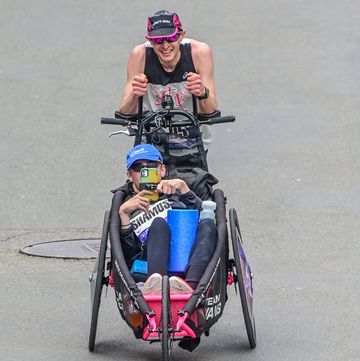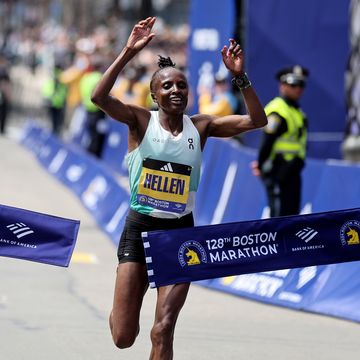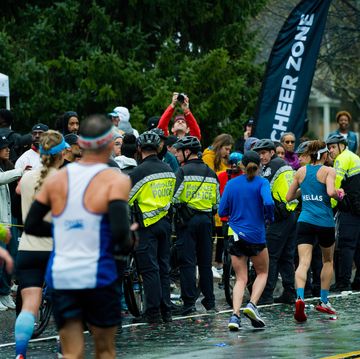Since her last competition in June at the U.S. outdoor championships, Gabriele Grunewald, 31, has divided her summer between home, in Minneapolis, and Memorial Sloan Kettering Cancer Center, in New York, where doctors are treating her fourth bout of cancer in a clinical trial.
Grunewald has been public about her life with adenoid cystic carcinoma, first diagnosed in 2009, when she was an NCAA middle-distance standout at the University of Minnesota. Her latest recurrence came in March, seven months after she had a large tumor removed from her liver. This time the scans showed the cancer has returned to her liver in the form of several more small tumors, which did not respond to chemotherapy earlier this summer.
In between those visits to the east coast, she’s managed to enjoy a few months of visiting friends and relaxing at her in-laws’ lake home. Grunewald is also running again and planning to start a nonprofit with some of the funds raised to support her while she’s going through treatments.
A new documentary tells the story of Grunewald’s quest to make it to the outdoor championships in the spring while managing her illness. She spoke to Runner’s World by phone from New York on Thursday to pick up where the film ended.
Runner’s World: How have things been going since you closed your track season in June at the outdoor national meet?
Gabe Grunewald: It’s been good; it’s been busy. My summer of treatment didn’t go as expected. It was pretty soon after USAs—maybe a week and a half later—I had a scan after two rounds of chemo. They didn’t notice any changes or any shrinkage [of tumors] or stabilization. It wasn’t a huge surprise, but I was disappointed, obviously. Chemo isn’t really that effective for my type of cancer, but it was a bummer because I was hoping my summer would be a little more predictable.
RW: Soon after that you moved on to a clinical trial for treatment?
GG: That week I talked to my doctor in New York. He thought the best plan was to start a clinical trial he had going on here at Memorial Sloan Kettering. I switched course very quickly. I came to New York in mid-July and had to do another biopsy and started immunotherapy about two weeks after my last chemo infusion. It’s been a summer of a lot more travel than I expected, because I do have to come to New York every two weeks for my immunotherapy infusion.
I just had my third infusion yesterday. It’s two rounds of three infusions. My immunotherapy is a combination of some of the newest ones on the market that have been really effective for advanced melanoma and now they’re testing it in a bunch of different cancers—mine is one of them.
RW: Can you explain what your immunotherapy is and how you receive it?
GG: I am far from a scientist or a medical professional, but the way I see it is that chemotherapy basically attacks all fast-growing cells in your body including cancer cells, but also healthy cells that divide rapidly. That’s why you can lose your hair and have those side effects of chemo. Immunotherapy is administered pretty similarly. I get an IV infusion of a clear liquid chemical, but it works differently than chemotherapy in that it boosts your immune system. Your immune system goes on like a 10 out of 10 power. You can still have side effects from that, but basically you’re trying to boost your own body to fight the cancer cells. So it doesn’t target healthy cells in the way that chemotherapy does.
RW: Does it make you feel sick at all?
GG: Since I’m in a clinical trial they’re still in the testing phase of what all the side effects are. Some of the side effects they ask me about every time are very similar to the ones they’d expect with chemo. But I would say that the range and how each individual responds are so different. Even with chemotherapy I don’t think that I had very many side effects—the biggest one was probably fatigue. So far on immunotherapy I feel like I’ve had almost zero symptoms. But they’re looking for any kind of “itis,” like colitis, inflammation, nausea, vomiting, rashes, fatigue, and low energy.
RW: What happens after you’re done with your two rounds of immunotherapy?
GG: At some point in the next six weeks I’ll have another scan and that’s when they’ll decide what’s next for me. The goal is that I’ll have some sort of response, either stabilization or shrinkage. We haven’t gone down the road of “what’s next.” We’re taking it one step at a time. The ultimate dream is that I can get some stabilization and not be on treatment for a while. Generally with immunotherapy effects can last longer without being on the treatment. With chemo, you basically have to be on it to get the effects of it.
RELATED: Donations Pour In to Support Gabe Grunewald’s Cancer Treatment
I hope I’m responding, but if I’m not, there are other drugs we can try that have been used in clinical trails and there are other trials opening up in 2018 for adenoid cystic carcinoma, so it’s possible I’ll enter another one if we don’t get the desired results. I’m still hopeful that we’ll find some way to stabilize my disease so I can ultimately just get some racing in next year. Even if I could get off treatment for three or four months, that would be awesome. If I can get off of it for longer, that would be even better.
RW: Are you able to run?
GG: I’m not in heavy training right now. I’ve started running again, and I feel so much better than I did on chemo. I feel like I have zero symptoms right now. I’m running with the intent of getting back into training this fall. I’ve been taking it slowly, getting back into miles.
I have been running after my infusions because it’s a good shakeout. [Wednesday] I took a long nap, then I ran 60 minutes. My energy feels pretty good. I’m definitely not doing workouts yet—this week I’ve done like 50 miles. My long run I’m trying to increase by a mile each week, so I’ll run 10 miles this weekend. I want to get into base training in September.
RW: How do you feel about the documentary? What are you hoping viewers get from it?
GG: It’s still really strange for me to see myself on the screen for so much time, but David Bracetty and his team did a really good job telling my story and my journey this spring trying to race. It was hard for me to balance how many interviews I was doing versus just focusing on racing and training. In May I made the decision that right now sharing my story is more important than running one or two seconds faster. I would have liked to run faster, but I felt like this was more important.
It’s really awesome to see how it’s touched so many people. That’s the reason I’m out here and I’m still trucking along. I hope people can feel encouraged and inspired by seeing me carry on and persevere through this cancer battle. I try to have the best attitude I can even though I definitely have my tough days and tough moments. It’s an important message to share with the world. We need as many inspiring, positive stories out there that we can get. If I can make my story as positive as possible, I think that’s the silver lining.
RW: You have been so open and generous with your time in sharing your story. Is that exhausting or do you draw strength from it?
GG: I think it’s both. Some days it’s easy and some days I’d rather just turn my phone off and throw it in a river. Sometimes I’m tired and I don’t feel like talking about it, because it’s personal and I’m not in control of the ending. I feel vulnerable and it’s hard to talk myself into being that vulnerable all the time. But I remind myself that the bigger picture is more important. There are so many people going through things like this and I really do think that we can get strength from each other. Since I’m in a position where people are willing to help me share my story and want to hear what I have to say and see me running, I try to open myself up for it because I feel like it’s the right thing to do.
RW: A lot of runners have been listening to your story. Have you received any messages or gestures from the community that have been especially helpful or meaningful?
GG: Definitely. It’s hard to pick a couple. I’ve been overwhelmed with people who have been encouraging and just want to help. My fundraising campaign has also been overwhelming because it surpassed any goals I had. It’s just humbling that so many people care and want to help. It really makes me want to give back myself.
ALSO: Biopsy Monday, Chemo Tuesday, Race on Saturday for Gabe Grunewald
My objective is before the calendar turns to fall officially, I need to get my nonprofit started. I want to make difference in the rare cancer area and help support patients entering clinical trials. There are a lot of barriers to entering trials. I’ve had so much generosity extended toward me so that I can get to New York and have a place to stay. People want to make sure that I can do that financially and have those resources. I know that not everybody has that, so it’s something I’ve been thinking a lot about. I hope there’s competitive running in my future but I also hope that there’s cancer philanthropy and fundraising in my future. There will be. It’s not a hope, it’s just a matter of getting it done.
RW: Outside of running and traveling for treatment, have you been able to enjoy the summer?
GG: It’s been a really good summer. There’s a lot of uncertainty ahead of me but the one thing I keep reminding myself of—and my husband reminds me—is that I feel good right now. I don’t really have any symptoms, so there’s no reason not to enjoy and do the things I want to do. My husband’s parents have a lake home in northern Minnesota. We’ve been going there a lot, which has been great. My best friend got married on Bainbridge Island [in Washington], so we went there early because it was my off week from treatment. It was awesome to spend time with friends and family.
I would have loved to be racing all summer but since I’m not, I’m doing all the things I sometimes miss doing while I’m racing—like sitting on a boat or visiting friends. I definitely have made the most of the summer, that’s for sure.
